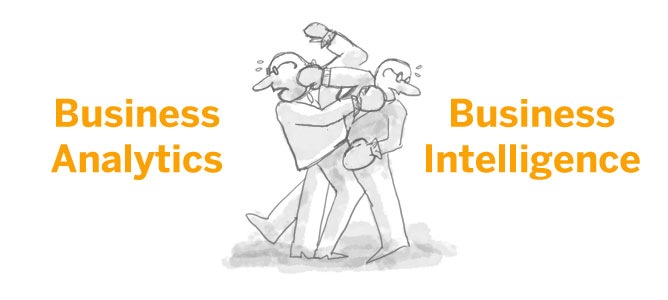
What’s the difference between Business Analytics and Business Intelligence? The correct answer is: everybody has an opinion, but nobody knows, and you shouldn’t care.

What’s the difference between Business Analytics and Business Intelligence? The correct answer is: everybody has an opinion, but nobody knows, and you shouldn’t care.
Having worked in the industry over twenty years, I can confidently say that everybody has a different notion of what ANY particular term associated with analytics means.
For example, when SAP says “business analytics” instead of “business intelligence”, it’s intended to indicate that business analytics is an umbrella term including data warehousing, business intelligence, enterprise information management, enterprise performance management, analytic applications, and governance, risk, and compliance.
But other vendors (such as SAS) use “business analytics” to indicate some level of vertical/horizontal domain knowledge tied with statistical or predictive analytics.
At the end of the day, there are two things worth differentiating:
- The first is the business aspect of BI — the need to get the most value out of information. This need hasn’t really changed in over fifty years (although the increasing complexity of the world economy means it’s ever harder to deliver). And the majority of real issues that stop us from getting value out of information (information culture, politics, lack of analytic competence, etc.) haven’t changed in decades either.
- The second is the IT aspect of BI — what technology is used to help provide the business need. This obviously does change over time — sometimes radically.
The problems in nomenclature typically arise because “business intelligence” is commonly used to refer both of these, according to the context, thus confusing the heck out of everyone.
In particular, as the IT infrastructure inevitably changes over time, analysts and vendors (especially new entrants) become uncomfortable with what increasingly strikes them as a “dated” term, and want to change it for a newer term that they think will differentiate their coverage/products (when I joined the industry, it was called “decision support systems” – which I still think is a better term in many ways).
When people introduce a new term, they inevitably (and deliberately, cynically?) dismiss the old one as “just technology driven” and “backward looking”, while the new term is “business oriented” and “actionable”.
This is complete rubbish, and I encourage you to boo loudly whenever you hear a pundit say it.
The very first use of what we now mostly call business intelligence was in 1951, as far as I can tell, with the advent of the first commercial computer ever, dubbed LEO for Lyons Electronic Office, powered by over 6,000 vacuum tubes. And it was already about “meeting business needs through actionable information”, in this case deciding the number of cakes and sandwiches to make for the next day, based on the previous demand in J. Lyons Co. tea shops in the UK.
And It most emphatically was not “only IT” or “only looking in the rear-view mirror” as some people pompously try to dismiss “old-style BI”.
At the end of the date, nobody important cares what this stuff is called. If you’re in charge of a project, what matters is working out the best way to leverage the information opportunity in your organization, and putting in place appropriate technology to meet that business need — and you can call that process whatever you like: it won’t make any difference…
If you have strong opinions on the topic, you may want to join in on this thread on the the brand new, business-oriented forum on the SAP Community Network. In the meantime, here’s why I changed the name of this blog from “BI questions” to “Business Analytics” a few months ago:
Google Trends on “business intelligence” – slow decline (note this is relative to overall search volume, not absolute)
Google Trends on “business analytics” – rising sharply